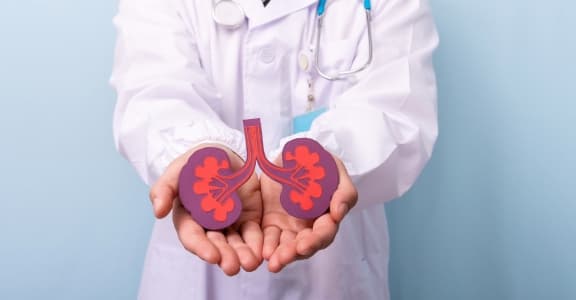How to Prevent Kidney Failure
By Dr. Satyanarayana Garre, Nephrologist, Hyderabad
Our kidneys are like natural filters of the body. They remove waste, balance fluids, keep blood pressure under control, and help produce red blood cells. When the kidneys stop working properly, it can lead to kidney failure, a life-threatening condition.
The important fact is that kidney failure does not usually happen overnight. It often develops slowly because of long-term health problems like diabetes, high blood pressure, or lifestyle habits. By taking care of your health and making small changes, you can protect your kidneys and prevent kidney failure.
In this article, let us look at simple and practical ways to keep kidneys healthy.
1. Know Your Risk Factors
The first step in prevention is awareness. Some people are at a higher risk of kidney disease than others. The most common risk factors are:
- Diabetes: High blood sugar damages the small blood vessels in the kidneys. Over time, this reduces their ability to filter waste.
- High blood pressure: Constant pressure damages kidney blood vessels and increases the risk of kidney failure.
- Obesity and heart disease: Both conditions are closely linked to poor kidney health.
- Family history of kidney disease: If someone in your family has kidney problems, your risk is higher.
- Unhealthy lifestyle habits: Smoking, alcohol, lack of exercise, and poor diet can put extra pressure on the kidneys.
If you have any of these risk factors, it is important to visit a nephrologist for regular check-ups. Early detection gives you more options to slow down or even stop kidney damage.
2. Make Healthy Lifestyle Choices
Your everyday habits have a big impact on your kidney health. Some important steps are:
- Eat a balanced diet: Include fresh fruits, vegetables, whole grains, and moderate protein. Avoid too much salt, fried foods, and processed snacks. Excessive protein, especially from red meat, can also stress the kidneys.
- Maintain a healthy weight: Being overweight increases your chances of diabetes and high blood pressure, which directly harm kidneys.
- Exercise regularly: Aim for at least 30 minutes of brisk walking, cycling, or swimming most days of the week. Regular activity helps control blood pressure and weight.
- Quit smoking: Smoking reduces blood flow to the kidneys and makes existing damage worse.
- Limit alcohol: Too much alcohol raises blood pressure and affects kidney function. Drinking in moderation, or avoiding it altogether, is better for your health.
These lifestyle changes may sound small, but over time they make a big difference in keeping your kidneys strong.
3. Manage Health Conditions Properly
Most cases of kidney failure are linked to poorly controlled diabetes and high blood pressure. Managing these conditions well can prevent further kidney damage.
- Diabetes control: Monitor your blood sugar regularly, take your medicines on time, follow a diet plan, and stay active. Keeping your sugar levels close to normal protects your kidneys.
- Blood pressure management: Check your blood pressure regularly, reduce salt intake, and take medicines prescribed by your doctor. Even small increases in blood pressure can damage kidney blood vessels over time.
- Heart health: AKeep cholesterol under control and manage any heart problems. The heart and kidneys work closely together, so protecting one helps the other.
Remember, regular monitoring and treatment under medical guidance is the key.
4. Use Medicines Safely & Go for Regular Tests
Not many people realize that unnecessary medicines can harm the kidneys.
- Avoid overuse of painkillers: Drugs like ibuprofen and naproxen, when taken often, can damage kidney function.
- Take medicines only as prescribed: Do not self-medicate. Always check with your doctor, especially if you already have kidney issues.
- Stay hydrated: Drinking enough water helps kidneys flush out toxins. However, if you already have kidney disease, ask your doctor about how much water you should drink.
Along with safe medicine use, regular tests are important. Simple blood and urine tests, like eGFR and urine protein, can show early signs of kidney problems. Even if you feel fine, these tests can detect hidden damage.
5. Watch for Warning Signs & Seek Medical Help Early
Kidney disease is often called a “silent killer” because symptoms may not appear until it is advanced. Still, there are some warning signs:
- Swelling in the ankles, feet, or around the eyes
- Changes in urination (more, less, or foamy urine).
- Constant tiredness and weakness.
- Poor appetite, nausea, or trouble sleeping.
If you notice these symptoms, do not ignore them. Consult a nephrologist immediately. Early treatment can slow down the disease and improve quality of life.
Final Thoughts
Preventing kidney failure is possible. By understanding your risks, eating healthy, staying active, managing medical conditions, and going for regular check-ups, you can protect your kidneys for years to come.
If you are in Hyderabad and want expert guidance, consult Dr. Satyanarayana Garre, an experienced nephrologist. He can help you assess your kidney health, create a personalized care plan, and guide you with the right lifestyle and treatment choices.
Your kidneys are precious—take care of them today to avoid complications tomorrow.
